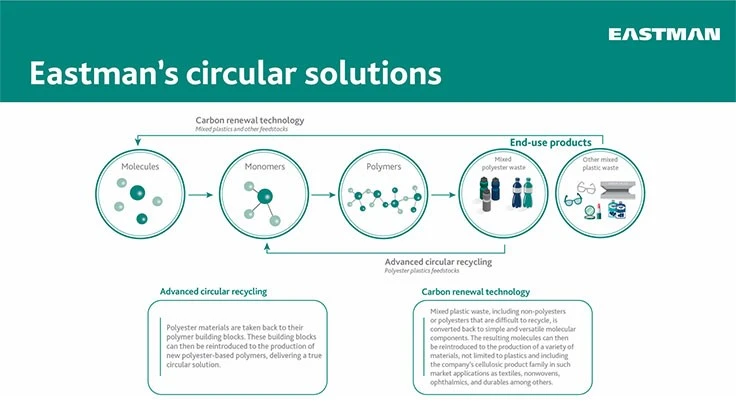
Following Kingsport, Tennessee-based Eastman’s March announcements of its methanolysis and carbon renewal technologies, Holli Alexander, strategic initiatives manager, global sustainability for Eastman, gave an update on the company’s plans to bring its chemical recycling technologies to commercial scale. She says Eastman’s plant will start producing products made with commingled plastics in the second half of 2019.
Established in 1983, Eastman modified its existing technology so the company could incorporate mixed plastics into its feedstock to help create a solution for the global plastic problem.
“Eastman had the opportunity to leverage our technology, expertise, innovation and our assets to be able to think about how we can do things differently than we’re doing today to help create a viable solution,” Alexander says. “Because we’re leveraging large scale existing assets that are operational today, we’re going to commercialize in 2019.”
She adds, “What’s happening right now in the industry around chemical recycling technologies is we are creating the demand for materials that haven’t been collected, with the intention of recycling. The development and creation of these new supply chains to bring these materials in is going to be one of the most significant and important challenges with both of these technologies for us.”
Collaborating with global brands, plastics manufacturers, municipalities and material recovery facilities (MRFs) to collect and source the material is a “new thing for us,” Alexander says. The company is exploring potential partnerships to gain a better understanding of the “characterization of the materials” on the marketplace today.
Through the development of the technologies, Alexander says, "We can start thinking about where plastics are being used across the consumer landscape and what we can do to start bringing those back and giving them another useful life after they’ve been used once."
Eastman’s circular recycling technology breaks down polyester-based products into their polymer building blocks, which can be used to produce new polyester-based polymers. The circular recycling technology will reach commercial scale within two to three years. The company’s carbon renewal technology is capable of recycling mixed plastics that cannot be recycled conventionally. The recycled content will be used to make eye glasses and frames, textiles and yarn and other products based on market demand, Alexander says.
“We’re really excited about having multiple solutions to be able to offer to the marketplace,” she says. “Depending on what the feed stream looks like, this is going to give us a chance to pick the right end-of-life recovery system to get the most value out of that material.”
With two technologies coming online at different times, Alexander says Eastman has an opportunity to start sourcing different plastics to create and develop new material streams that don’t exist today.
“If there are polyester streams, we can leverage those in the carbon renewal process and move those streams into the advanced circular recycling” once it’s online, she says. “The one that’s online first is the one that has the broadest specs in terms of the material it can take.”
According to the New York-based Closed Loop Partners, more than 40 chemical recycling technology companies will reach commercial scale within the next two years in the U.S. and Canada. The variety of chemical recycling technologies are capable of processing PET, polyester, films plastic and complex packaging.
“I think building and creating these supply chains is going to be an interesting development that’s going to happen over the next few years with the variety of different chemical recycling companies that are coming online from Eastman and other technology companies," Alexander says.
Get curated news on YOUR industry.
Enter your email to receive our newsletters.
Latest from Recycling Today
- Unifi launches Repreve with Ciclo technology
- Fenix Parts acquires Assured Auto Parts
- PTR appoints new VP of independent hauler sales
- Updated: Grede to close Alabama foundry
- Leadpoint VP of recycling retires
- Study looks at potential impact of chemical recycling on global plastic pollution
- Foreign Pollution Fee Act addresses unfair trade practices of nonmarket economies
- GFL opens new MRF in Edmonton, Alberta






